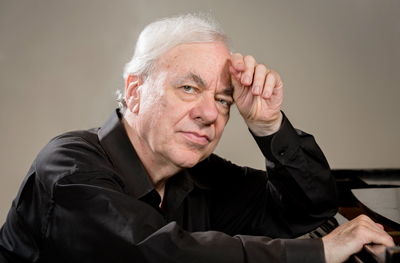by Mike Telin

On Sunday, April 9 at 4:00 pm in Finney Chapel, Richard Goode will return to Northeast Ohio as part of the Oberlin Artist Recital Series. His program will include J.S. Bach’s Partita in e, BWV 830, Beethoven’s Sonata No. 28 in A, Op. 101 and Sonata No. 31 in A-flat, Op. 110, as well as Chopin’s Nocturne in B, Op. 62, No. 1, Polonaise in f-sharp, Op. 44 and three Mazurkas: Op. 41 No. 2 in B, No. 3 in A-flat and Op. 50 No. 3 in c-sharp.
In a review of Goode’s performance last season on the Cleveland Chamber Music Society series, when he also played Beethoven’s Op. 110, ClevelandClassical.com’s Daniel Hathaway wrote:
In an era when most pianists memorize their recital repertoire, it was refreshing to see Richard Goode using scores for all of his insightful performances… Rather than forming a barrier between pianist and audience, the presence of printed music seemed to reflect a deeper immersion in each piece on the part of the artist.
. . .
The pianist took Beethoven’s first-movement directions quite literally (“moderately, singing, with much expression”), producing a dark tone for the fortes, and highly varied dynamics, each of which came with its own coloration. Goode showed excellent control over touch and articulation in the mercurial Scherzo, and sang an eloquent recitative in the Adagio, making an amazing moment out of a repeated note that rose to a forte then back to piano. He began the fugue musingly, with the subject always in high profile, then brilliantly signalled its eventual reappearance.
Richard Goode spoke with Hathaway before that recital about who has influenced his Beethoven playing, and about one of his hobbies. The following is an excerpt from that conversation.
Daniel Hathaway: You’re highly regarded for your interpretations of Beethoven. Who have been your major influences there?
Richard Goode: I think I worked with Claude Frank too young to be influenced that much. I only remember studying one piece with him, Beethoven’s first concerto. Rudolf Serkin influenced me greatly. One of the first concerts I can remember hearing was Serkin playing Op. 101 and the Diabelli Variations. I also heard him play Op. 110. But more than that, I heard him frequently at Marlboro and studied with him at Curtis. His general approach to music and to Beethoven specifically was very influential. I think probably the strongest impression any performer gave me in my early teenage years was Serkin’s Beethoven with its dramatic intensity. Also pieces like the Schubert A-Major Sonata, which I didn’t know before I heard Serkin play it. He had a dramatic engagement with the music, and I also have to say with the piano itself.
But subsequently I was very much influenced by Schnabel. I only heard him in recordings, but his sense of form and the articulateness of his approach to musical structure and balance, phrasing and detail was powerful. And Mieczysław Horszowski also made a great impression at Curtis. He was temperamentally so different from Serkin, and yet so cogent and beautiful in his approach to Beethoven as well as to all the other music I ever worked on with him. He was one of those people who could approach Bach, Chopin, Beethoven, Liszt, and Schubert with equal authority and understanding.
DH: I promised to keep this brief, so I have only one last question. I read in your biography that you and your wife have amassed a 5,000-volume collection of books in your home in New York. What do you like to collect?
RG: Well, you know, I’m not a collector, I’m an accumulator. I have a passion for buying books. I read quite a few books, but certainly nothing like the volume of books that I buy. It’s apparent to me that that’s become a problem! I read a great deal of art history, a lot of fiction and poetry, memoirs, essays — all kinds of things. I don’t have a special field, and if I acquire a valuable book, it’s by accident. I may have some first editions there, but in most cases, I didn’t know about them before I bought them.
Published on ClevelandClassical.com March 31, 2017.
Click here for a printable copy of this article


